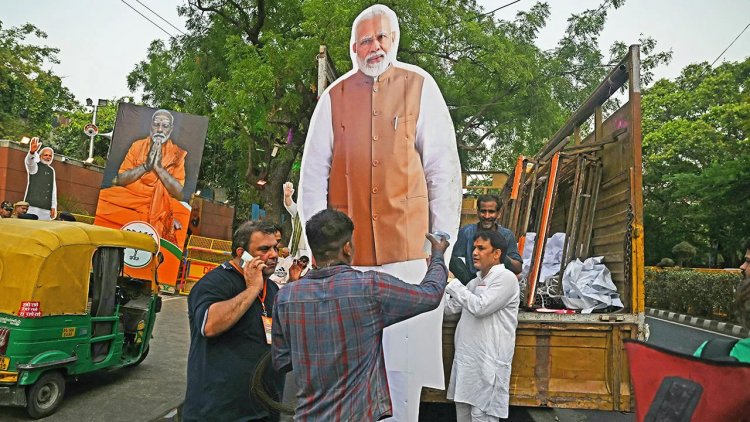BJP: Succession and Other Pressures
Asia News Agency

The speculation over PM Modi’s successor continues. This however, writes Shikha Mukerjee (senior journalist based in Kolkata) “has less to do with the BJP and is more a response to the tantalising messages that have been delivered by the RSS boss, Mohan Bhagwat, about what is the appropriate age of retirement, that is, 75 years, in recent months….”
The buzz around the age bar on 75 started when the BJP made it a point in 2014 of accommodating senior leaders above this age like Lal Krishna Advani and Murli Manohar Joshi as mentors, when both leaders were over 80 years old and both had won Lok Sabha seats in the historic 2014 elections. This had paved the way for PM Modi to succeed without any competition.
The unhealthy speculation
The age bar has come to haunt the Prime Minister now although PM Modi most dependable ally, home minister Amit Shah, has said there is no age limit on holding office within the BJP.
The speculation nevertheless, “is unhealthy for the people who are engaging in conversations about it on street corners; it is unhealthy for the endless games of thrones that are played out in the corridors of power in India; it is unhealthy and unsettling for India vis-à-vis its relations with the rest of the world, particularly in a turbulent period when upheaval is becoming the norm instead of the exception."
Speculation within RSS and BJP
The problem is that the speculation is happening “within the RSS and its legions of devoted cadres, and within the BJP….” The speculation is also happening at a time when the BJP has not, as yet, found a successor for its president, J.P. Nadda, who currently is holding office as party head and Union minister, in violation of the well-defined precedent of one person-one office.”
If there is any truth whatsoever in the speculation, “it would mean that there would be a process of transition. And any transition of power is a time uncertainty. That said, Mukerjee stats “the point is that the BJP is not the decision maker about Mr Modi’s continuation in office as the Prime Minister…..”
NDA facing multiple pressures: probable major shake-up in the BJP
Beyond the succession battles, the surprise, sudden resignation of vice-president Jagdeep Dhankhar, in the view of Sunil Gatade (journalist based in New Delhi) “might lead to a major shake-up in the BJP and the government, given Prime Minister Narendra Modi's policy of not giving a quarter to his detractors, within and without. The only caveat is that there is still considerable uncertainty on how much and how well Mr Modi has patched up with the RSS, letting it say that bygones are bygones….”
Though a Modi loyalist, Dhankhar through his actions in the Rajya Sabha showed “that he had a mind of his own.” This did not sit well with the establishment.
“What Mr Dhankhar has done through his abrupt resignation, which was a forced one, is that it has made the PM see the dangers ahead. The inordinate delay in electing the next BJP president has not done the strong leader proud either. In such a scenario, episodes like the Dhankhar exit make the scenario more alarming. The leader tends to think that there are enemies everywhere…..”
However, “it is to the Prime Minister’s credit that he has handled Bihar chief minister Nitish Kumar and Andhra Pradesh CM N. Chandrababu Naidu, the two main crutches of Modi 3.0, extremely well. So, in the changed situation, the Prime Minister is bound to conduct an exercise of shuffling his pack to keep the men under constant pressure. Shocks make leaders more insecure.
“……Mr Dhankhar has in effect helped Mr Modi become firmer. It depends on how the RSS is convinced of the gravity of the situation in the aftermath of Operation Dhankhar.”
All said, PM Modi and his government are facing multiple pressures not the least from Trump’s tariffs. “What is worse is that Mr Trump joined forces with Pakistan…The EC’s controversial Special Intensive Revision in poll-bound Bihar has brought the Opposition together like never before….”
Amending law for acquisition of overseas critical mineral assets
The government is planning amendments to the mining laws, aimed primarily at allowing state funding for acquisition of overseas critical mineral assets. The proposal has received the necessary approvals within the government and the Bill to amend the Mines and Minerals (Development and Regulation) Act may be moved in Parliament soon.
The government is proposing to fund such acquisitions from collections accrued in the National Mineral Exploration Trust (NMET). The trust currently has more than ₹6,000 crore in its corpus, collected from mining lease holders who need to deposit 2% of the applicable royalty with it.
This trust will also be renamed to include ‘development’ in its name, signifying its expanded mandate to cover exploration, acquisition and development of critical mineral assets abroad as well.
The amendment, writes Twesh Mishra (Editor, The Economic Times)
“will address the core issue of critical mineral raw material availability.”
















